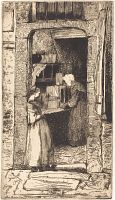La Marchande de Moutarde | ||
| Number: | 20 | |
| Date: | 1858 | |
| Medium: | etching | |
| Size: | 157 x 90 mm | |
| Signed: | 'Whistler' at lower left | |
| Inscribed: | 'Imp. Delatre. Rue St. Jacques. 171.' (2-3); crossed out (4); removed (5) | |
| Set/Publication: | 'French Set', 1858 | |
| No. of States: | 5 | |
| Known impressions: | 75 | |
| Catalogues: | K.22; M.22; T.11; W.16 | |
| Impressions taken from this plate (75) | ||
PUBLICATION
13: 30 October 1886, pp. 299-300.
EXHIBITIONS
After its exhibitions in Paris and The Hague, it was shown in Whistler's one-man show in London in 1874. 16 In an 1874 review it was related both to the work of Rembrandt Harmens van Rijn (1617-1681), and to French language and culture:
14: Paris Salon 1859 (cat. no. 3673).
15: Hague 1863. See REFERENCES: EXHIBITIONS.
16: London Pall Mall 1874 (cat. no. 40).
Impressions also appeared in print dealer's shows, particularly at H. Wunderlich & Co. (1898, 1903) and F. Keppel & Co. (1902) in New York, and Obach & Co. in London (1903), including first and second states shown in New York and London in 1903. Charles Lang Freer (1856-1919) bought an impression of the second state from the 1898 show ().
18: Liverpool 1874 (cat. no. 511).
19: New York 1881 (cat. no. 24).
20: Glasgow 1888 (cat. no. 2552-10)
21: Chicago 1900 (cat. no. 16).
22: Boston 1904 (cat. no. 10); New York 1904a (cat. no. 17);London Mem. 1905 (cat. no. 16); Paris Mem. 1905 (cat. no. 297).
SALES & COLLECTORS
23: GUW #07079.
24: V&A, Register for Prints, p. 33.
25: 28 December 1888, GUW #13076.
The etching was also, of course, sold with the 'French Set'; for instance, a complete set was bought by Colnaghi's in 1894 for £6.0.0. 27 A single impression was sold at the J.M. Gray sale in November 1894 for £1.12.0. 28 The Kupferstichkabinett, Berlin, paid far more - £9.10.0 - for an impression bought from Obach & Co. in 1902 ().
26: Sotheby's, 30 April 1876 (lot 740); 15 December 1896 (lot 263); and 3 March 1892 (lots 59-60); Wedmore 1886 A[more] (cat. no. 16).
27: Christie's, 31 July 1894 (lot 8).
28: 'J.M. Gray sale', The Academy, 17 November 1894, p. 405.
